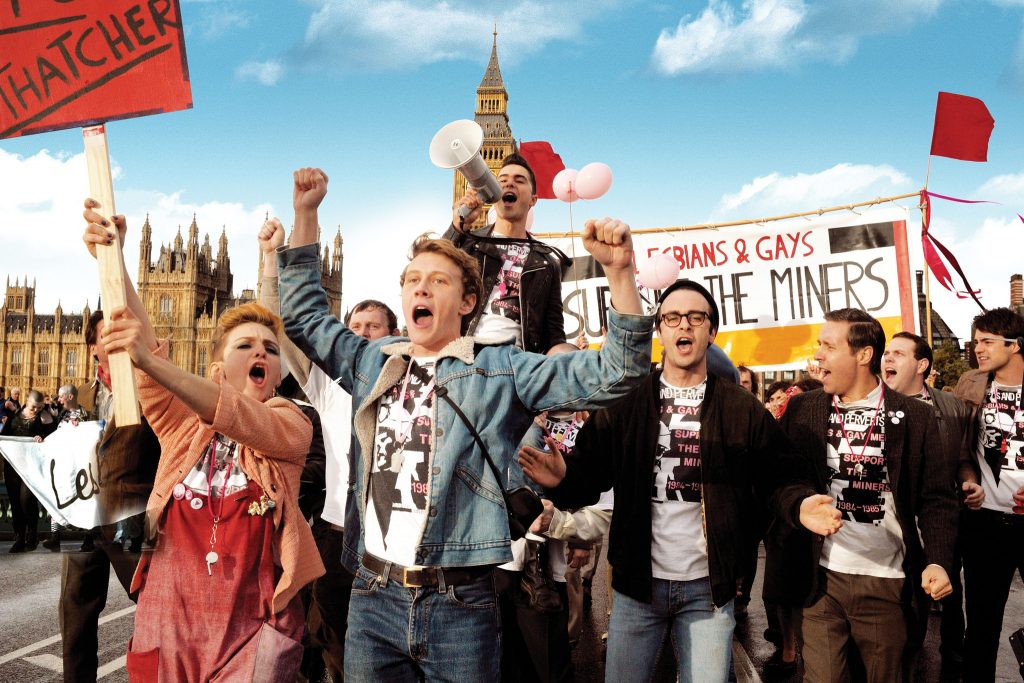 It may be an ‘older’ film as far as the sudden and warranted increase in LGBTQ+ films is concerned. But 2014’s Pride should warrant a watch if you’ve not seen it, or a rewatch considering it’s Pride Month.
It may be an ‘older’ film as far as the sudden and warranted increase in LGBTQ+ films is concerned. But 2014’s Pride should warrant a watch if you’ve not seen it, or a rewatch considering it’s Pride Month.
If you pitched Pride on paper, it might sound like someone threw a BBC3 sitcom and a union protest documentary into the same blender and hit purée. It’s a true story, yes, but it’s also a riotously funny, oddly moving film about a group of queer activists who decide to support the miners during the 1984–85 strike. And against all odds, it works – both the unlikely alliance, and the film itself.
There’s a fine line between earnest and embarrassing when it comes to British feel-good cinema, but Pride walks that line with the grace of someone who’s marched in a parade wearing six-inch heels. It’s self-aware, never smug, and funny without leaning too hard on the usual Brit-com tropes. More importantly, it’s got heart – but not the kind you want to roll your eyes at. The good kind. The earned kind.
The cast is basically a who’s-who of reliable British talent, and everyone’s clearly having a brilliant time. Ben Schnetzer plays Mark, the fiery leader of “Lesbians and Gays Support the Miners,” with the kind of passion that could rally a room full of cynics. George MacKay plays Joe, a closeted teen tentatively finding his place in the movement, and while the story isn’t about him, it smartly uses his coming-of-age arc as an anchor.
Then there’s the Welsh mining village, where the arrival of the group is met with a mixture of bemusement, hospitality, and cold shoulders. Watching the cultures clash, then slowly blend, is half the joy. You get Imelda Staunton delivering one-liners with withering precision, Bill Nighy (who, to me, is usually the sign the film will be good and typically moving) doing his restrained melancholy thing to perfection, and a host of smaller characters who never feel like caricatures, even when they probably should.
What’s most impressive is how the film refuses to sand down the edges of either community. There’s friction, there’s prejudice, there’s discomfort. But it doesn’t tip into misery or martyrdom either. It trusts the strength of its real-life story enough not to embellish it unnecessarily. There’s just something quietly powerful about seeing people listen to each other, however reluctantly, and find common ground in shared struggle.
Tonally, it’s a bit of a tightrope walk. You get one scene that’s almost pure comedy, followed by a gut-punch reminder that police harassment and Thatcherite politics were a very real and brutal part of the era. But again, Pride handles this without feeling like it’s trying to juggle two films. It’s one story, told with nuance and, crucially, warmth.
Visually, it’s unflashy but confident. There’s a lived-in quality to the sets, the costumes, and even the lighting. It all feels deeply ‘80s without leaning too hard on pastiche. The soundtrack is similarly spot-on, lots of synth and stomping anthems, but also some clever needle drops that enhance rather than distract.
There’s an optimism here that sneaks up on you. It doesn’t come from ignoring the hardship or the conflict, but from looking directly at it and choosing solidarity anyway. That might sound sentimental, and maybe it is, but it’s the kind of sentiment that feels earned. And in today’s climate, the idea of building bridges through compassion, humour, and shared chips at the community hall feels radical all over again.
Yes, it hits the familiar beats you’d expect from a British ensemble drama: the unlikely friendships, the pub scenes, the “we’re not so different, you and I” moments. But it does them all better than most, with sharper writing and a genuine emotional core that doesn’t rely on manipulation. You laugh because it’s funny. You cry because it’s honest.
Pride is the kind of film that leaves you smiling through the credits without ever feeling like you were pandered to. It’s rousing, charming, and surprisingly potent. As mentioned at the start, if you haven’t seen it, you probably should. And if you have, well, it probably deserves another watch.
Author: Tom, Cardiff Store







